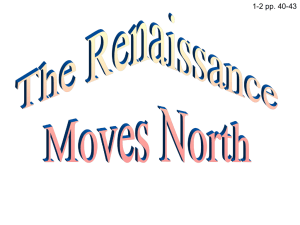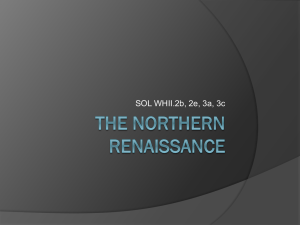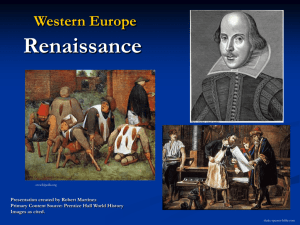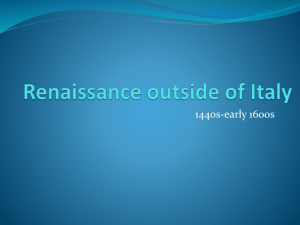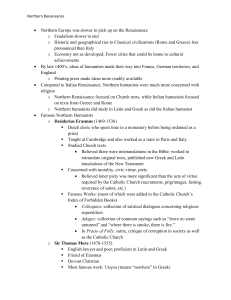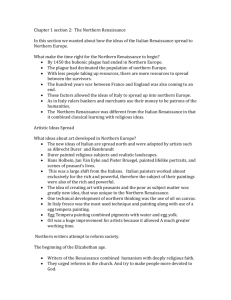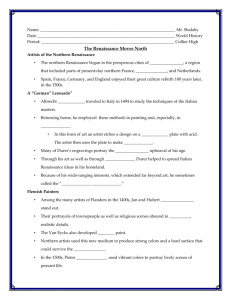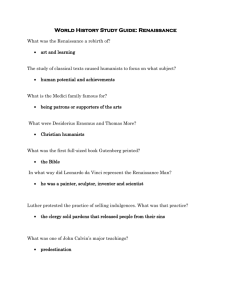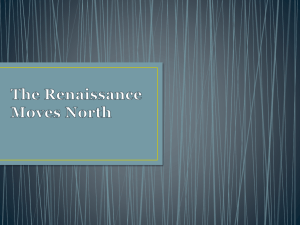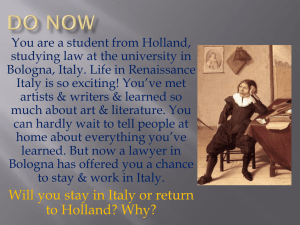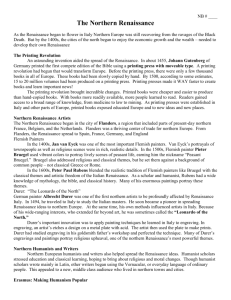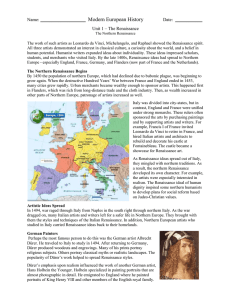The Renaissance Spreads North
advertisement
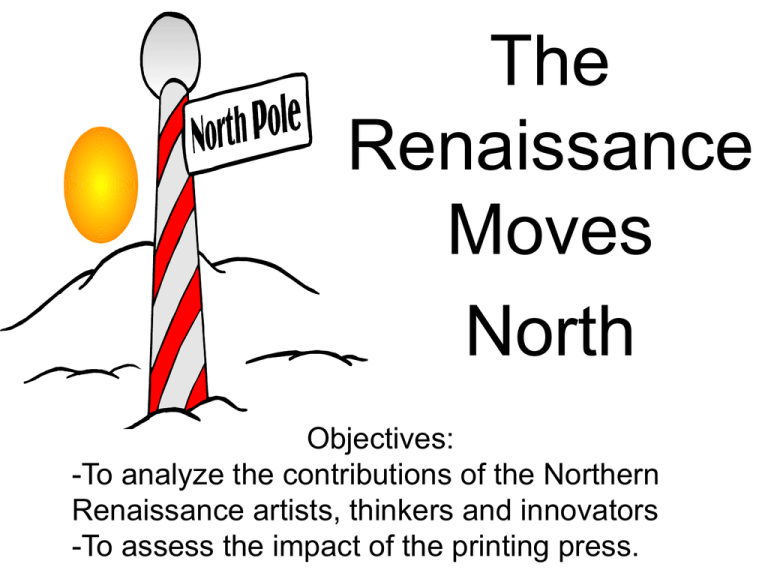
The Renaissance Moves North Objectives: -To analyze the contributions of the Northern Renaissance artists, thinkers and innovators -To assess the impact of the printing press. Albrecht Dürer • Albrecht Dürer traveled to Italy in 1494 to study the techniques of the Italian masters. • Returning to Germany he employed these methods in paintings and, especially, in engravings. • In this form of art, an artist etches a design on a metal plate with acid. • The artist then uses the plate to make prints. Peasant and His Wife “Feet of An Apostle” • Like the Italian artists of the Renaissance, Durer tried to achieve a standard of ideal beauty that was based on a careful examination of the human form. Hands of Horus “German Leonardo” • Through his art and his essays, Dürer helped spread Italian Renaissance ideas in his homeland. • Due to his interests that extended far beyond art, he is sometimes called the “German Leonardo.” • Northern European humanists, like Italian humanists, stressed education and classical learning. • At the same time, they still emphasized religious themes. • The revival of ancient learning was believed to bring about moral and religious reform- this was different than the Southern European humanists who did not stress religion. Northern Humanists The summit of happiness is reached when a person is ready to be what he is. –Erasmus • What does this quote mean? • How can you relate this to your life? The Dutch: Erasmus • Desiderius Erasmus, the great Dutch priest and humanist wrote a new Greek edition of the New Testament. • He also called for a translation of the Bible into the vernacular, or everyday language of ordinary people. • What is our vernacular? • What are words that you use that are unique to your generation or group of friends? • What are the benefits of information in your language? • To Erasmus an individual’s chief duties were to be open-minded and of good will toward others. • He was disturbed by corruption in the Church and called for reform. More • Erasmus’s friend, the English humanist Thomas More, also pressed for social reform. • In Utopia, More describes an ideal society in which men and women live in peace and harmony. • No one is ideal, all are educated, and justice is used to end crime rather than to eliminate the criminal. • Today, the word utopian has come to describe an ideal society. • Why do you think that peasants would like the book Utopia? • What song(s) can you think of that reflects the ideas of Utopia? Rabelais • Had a varied career as a monk, physician, Greek scholar, and author. • Gargantua and Pantagruel, chronicles the adventures of two gentle giants. • On the surface the novel is a comic tale of travel and war. • But Rabelais uses his characters to offer opinion on religion, education, and other serious subjects. • What shows today are comical but offer their opinions about serious subjects? • Why would someone want to or need to hide their opinions in comedy? • Poet and playwright • Between 1590 & 1613, he wrote 37 plays that are still performed around the world. • He wrote comedies, historic plays, tragedies • Shakespeare’s love of words vastly enriched the English language. • More than 1,700 words appeared for the first time in his works, including bedroom, lonely, generous, gloomy, heartsick, hurry, and sneak. Shakespeare Have you seen Shakespeare? The following modern movies are loosely based on famous Shakespearean works… • The Lion King • 10 Things I Hate About You and Deliver Us From Eva • She’s the Man/Mulan/ Big Momma • “O” • West Side Story/Teen Beach Movie Hamlet The Taming of the Shrew The Twelfth Night Othello Romeo and Juliet Cervantes • Don Quixote by Miguel de Cervantes mocks the romantic notions of medieval chivalry. • Don Quixote is a foolish but idealistic knight that seeks to be a hero but finds that the time of the knight has ended. The 13 Most Influential Inventions in History • What do you think the most influential inventions have been? • Harnessing/Applying Electricity • The computer • The internet • The steam engine • Steel • Gunpowder • The atomic bomb • The car • Radio • Telephone • Television • The printing press The Printing Revolution • Methods of making paper had reached Europe from China about 1300. • The Chinese and Koreans had been using moveable type for centuries. • Johann Gutenberg of Germany, printed a complete edition of the Bible using movable type metal type on a machine called a printing press. • The use of this invention TRANSFORMED EUROPE!!!!! • Prior to the printing press books were written by hand and were very expensivetaking between 6 months and a year to write just one book. Immense Changes • Printed books were cheaper than hand copied books. • More people learned to read. • Readers gained access to a variety of subjects. • Exposed educated Europeans to new ideas. • Contributes to the religious turmoil that swept Europe in the 1500s.
